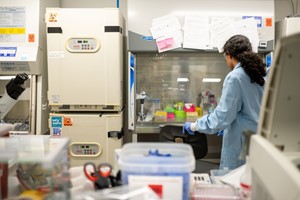Hundreds of thousands of cervical cancer cases per year could be prevented through widespread vaccinations for human papillomavirus (HPV) and annual pap smear tests, says an expert at a top American hospital, Cleveland Clinic, marking Cervical Cancer Awareness Month in January.
Dr. Robert DeBernardo, Section Head of Gynecologic Oncology and Vice Chair Subspecialty Care for Women’s Health at Cleveland Clinic, said: “Cervical cancer is one of the leading causes of cancer-related death for young women, but is also entirely preventable between widespread HPV vaccinations and early and frequent annual screenings with pap smear tests. HPV vaccines can protect both men and women from HPV infections; women from cervical cancer; and men from many types of head and neck cancer, too.”
Cancer of the cervix is the fourth-most common cancer among women worldwide, according to the World Health Organization. About 570,000 women are diagnosed with cervical cancer every year, and 311,000 die from the disease annually.
The United States’ National Cancer Institute reports recent research found widespread HPV vaccinations reduced cervical cancer by 90 percent. It is estimated that 99 percent of cases of cervical cancer are caused by human papillomaviruses (HPV), frequently acquired through sexual contact, although only specific types of HPV are a risk factor for cervical cancer.
Dr. DeBernardo recommends that women should see a gynecologist annually from the age of 21 onwards and take pap smear tests when recommended by their gynecologist. Pap smear tests are simple tests involving swabbing from the cervix to collect cells, which are then analyzed for the presence of high-risk HPV types in cells and pre-cancer changes in the cervical cells.
“Cervical cancer can develop slowly over many years, with pre-cancerous cells becoming cancerous, which is why screening is vital,” added Dr. DeBernardo. “The good news is that cervical cancer is very treatable, especially if it’s caught early on. In developing countries that may lack the testing infrastructure, there is strong potential for low-cost take-home pap smear tests. Women can take the tests at home, and if they test positive, can undergo follow-up medical exams.”
In the initial stages, cervical cancer can be treated by surgical removal of the cancerous tissue or radiation therapy. Cleveland Clinic cites a five-year survival rate of more than 90 percent if it is caught in the earliest stage. Later-stage treatment options can include surgery, radiation, and chemotherapy.
Supporting treatment innovations, Cleveland Clinic has trialed new medical devices to treat pre-cancer lesions, including a non-gas cryotherapy machine to freeze the lesions, and one that uses heat, rather than cold, to remove the lesions. These devices can be especially useful in developing countries with limited access to hospital facilities and to the cryogenic gas to freeze lesions.
Cleveland Clinic













